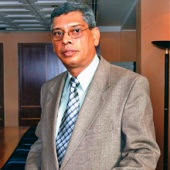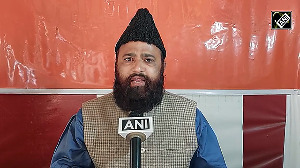 A global steel producer is putting up 14-million-tonne capacity, Essar Steel aims to achieve a global capacity of 20-25 mt.
A global steel producer is putting up 14-million-tonne capacity, Essar Steel aims to achieve a global capacity of 20-25 mt.
In an interview with Ishita Ayan Dutt, its chief executive officer, Malay Mukherjee, explains the importance of captive raw material resources in a volatile market and the urgent need to overhaul the system of mine allocation. Edited excerpts:
Essar Steel has set a target of increasing capacity to 20-25 million tonnes?
It's a long-term vision. The priority is to get 14 mt going, 10 mt at Hazira and four mt at Algoma. The Hazira assets are just getting commissioned, so by 2012 we should be at 10 mt there.
In Algoma, we are operating at 3mt; we have the smaller blast furnace ready. It's the market situation; we don't want to disturb the North American market by putting in capacity.
If tomorrow the market improves, we will be in a position to produce four mt.
Is there a time frame for realising the long-term vision?
It arises from the commitments, as well as MoUs (memorandums of understanding) with various state govts. These are linked to raw material.
It's a chicken and egg story. You need the raw material, otherwise you are not going to invest. We have our plans in Jharkhand, Chhattisgarh.
In Orissa, we are already completing the first phase. In Karnataka, we have signed the MoU and the government is looking to provide land.
But we also want the mines. We don't want to create a situation where all the investments are done and then you say the mines are not available.
The Orissa government has a clause in the MoU that the state will recommend mines once you have made commitments for 25-30 per cent. . .
Yes, commitments have to be made, which implies it could be orders. But a 12-million tonne plant will cost anything between $12 billion and $15 billion.
Thirty per cent of that will be $4.5 bn. How can anyone expend $4.5 bn in the hope that one will get the mines? It's easier for smaller players.
Is it a policy decision that you will not go ahead with new projects if you don't have mines?
No. it's a question of how the process works in mine allocation. Today, the process is practically at a standstill. The government is trying to change the rules, and rightly so, for the future.
State governments in their anxiety to do things have done it wrong.
Iron will be vital for the steel industry. And, there must be a level playing field for all operators. I'm running a 10-mt facility, I also need my iron ore.
SAIL is running a 12-mt plant and sitting on iron ore. There has to be some sort of a level field.
Which brings us to Chiria. . .
The way I look at it, personally is, why can't we follow the same principle as for the oil and gas sector? You have blocks which you auction for an operator.
The Supreme Court has clearly laid down that the product belongs to the nation. The government is within its right to do the allocation.
So, why can't we do the same with a disputed site like Chiria? Put it up for auction for an operator and the product. The pricing is fixed by the government, as they are doing for gas.
Has the shift to quarterly contracts worked for the steel industry?
I don't think it will last. It's too volatile to last. This quarter, the prices are down by 13 per cent.
One quarter it's up 40 per cent and the next it's down by 13 per cent. The entire financial model of any organisation will go if it is like that.
Are you still scouting for raw material assets?
In terms of securitisation, definitely. If there are good deals anywhere, we will look at it.
What do you think of the government proposal to share 26 per cent profits with surface-right owners of mines?
In the 1990s, employees got shares in Russia. But what did the managers do? When they distributed the shares, instead of giving these, they bought out the shares for 10 roubles.
There was nothing illegal about it, but the people who were supposed to benefit did not. The thought was good, implementation was a problem.
Image: Malay Mukherjee







 © 2025
© 2025